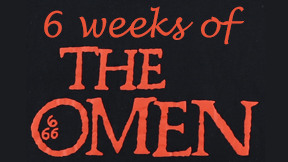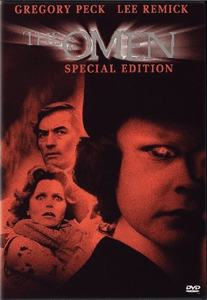Religion is a source of comfort and light to billions, but it’s also a source of foreboding darkness for horror movies. What’s remarkable is that it only takes the slightest tweak of Scripture – or sometimes no tweak at all – to make this shift. “The Omen” (1976) is perhaps the purest example of this trick.
Thin line between religion and horror
In David Seltzler’s sweeping yet tight screenplay, Father Brennan (Patrick Troughton) harasses Robert Thorn (Gregory Peck) about how he needs to participate in communion in order to become Christian, get Jesus on his side, and fight off his evil adopted toddler Damien (Harvey Spencer Stephens). But he doesn’t say “Participate in communion,” he says “Drink his blood.” It’s no filmmaking accident that this is the most horrific way for Brennan to phrase the situation.
The first and best of the three franchise-launching masterpieces from director Richard Donner (along with “Superman” and “Lethal Weapon”), “The Omen” is one of the all-time great religious horror films. Interestingly, it could be read as critiquing — or even outright making fun of – religion.

“The Omen” (1976)
Director: Richard Donner
Writer: David Seltzler
Stars: Gregory Peck, Lee Remick, David Warner
Over six Tuesdays, RFMC is looking back at five films and one TV series in the “Omen” franchise.
Indeed, when the Thorns bring Damien to a church for an important wedding in political circles, the youngster bawls in terror and pain and they have to immediately turn around and go home. Damien’s nanny, Mrs. Baylock (Billie Whitelaw), had previously lectured Katherine Thorn (Lee Remick) about how church is inappropriate for a young child.
That’s a stark commentary for a mainstream film, but “The Omen” gets away with it because it’s clear from the beginning that Damien is the offspring of the Devil and Baylock is looking out for him. (Mirroring the Holy Trinity, by being the son of the Devil, Damien is also the Devil himself.)
Scares in the daytime
Distinguishing itself from “The Exorcist” (any review of “The Omen” can’t help but mention that other religious horror classic from three years prior), Donner’s film has more daylight horror elements. (Well, overcast daytime horror anyway – this is London, after all.)
It also has its share of nighttime horror – including the Italian cemetery sequence with the pack of barking black dogs. (My only criticism of “The Omen” is purely technical: The barks and screams are too loud in the sound mix.)
But three iconic death scenes happen in the daytime, as does Katherine’s domestic accident. All of these are iconic practical effects shots. Even if you haven’t seen “The Omen,” you’ve seen clips if you watch horror history documentaries.

My favorite sequence finds an increasingly fearful Father Brennan running through a beautifully shrub-shrouded British park to get to the sanctuary of a church. Clouds roll in, lightning takes out tree limbs, and the shrubs sway – via wind machines, but because it’s a supernatural threat, it makes sense.
“The Omen” is a more traditionally dramatic film than “The Exorcist,” which gets by on mood and scares to distract from its straightforward narrative and the helplessness of its characters. Unlike “The Exorcist’s” mom, Robert has agency and direction toward solving this situation.
Peck gives a masterfully measured performance as the U.S. Ambassador to the U.K. who gradually sheds that identity and becomes “husband” and “father” instead. A father with a horrific choice to make.
Weird but well-meaning decision
It all starts with Robert’s weird but well-meaning choice: He substitutes the orphan Damien for his deceased newborn. Then he spends the rest of the film paying for it. Robert is a little arrogant in an old-school leading man way, and certainly imperfect, but he’s so undeservedly pummeled by troubles that he has our sympathy the whole way.
An interesting side theme, considering 2022 politics, is abortion, as it was in another Seventies horror classic “Black Christmas” (1974). Katherine wants Robert’s permission to abort what would be their second child; he doesn’t want to give it. I think this simply shows the power dynamic between the Thorns; there’s no question he is the leader of the family.
Modern viewers might see it as a legal commentary. The very year “The Omen” came out, the U.S. Supreme Court ruled that a mother does not need the father’s permission to get an abortion.
Giving “The Omen” a slight investigative vibe (which smoothly slots it alongside Seventies conspiracy noir), Robert and photographer Jennings (David Warner) travel to Italy to ferret out Damien’s biological backstory.
“The Omen” has influenced numerous horror films since, but one of the oddest might be “Final Destination 3”: Jennings sees omens of future deaths in his photographs. Since his own picture shows his demise, he is invested. I like how he becomes allies with Robert, undercutting what could’ve been a lonely “one man against the world” vibe.
The Everyman politician
Initially it seems an odd choice to have the Everyman hero be a political ambassador, but Robert’s job is a purposeful choice by Seltzer. Damien’s handlers purposely put him in a powerful family. Thus, when he grows up, he’ll have easier access to the halls of power.
Interestingly, this logical approach leads to a bit of illogic. Robert seems to be not merely non-Christian, but an atheist. (If he was another religion, that surely would’ve come up in the narrative. When the Thorns try to take Damien for church, it seems they are invited because of political connections, not church connections.)
Robert and Katherine lightly joke about how they’ll be in the White House one day. But logically, an atheist has almost zero chance of becoming president of the United States; it has never happened, and political scholars say atheists are among the least likely minority groups to reach the highest office.
But that’s actually another element that makes “The Omen” great. I think about Damien’s future challenge – as a being terrified by church who will need to fake being devout in order to achieve political power – as a perk of the continuing story, not a bug.
Donner and Seltzer craft a world so thoroughly compelling that I want to find out what happens next. Whether the sequel materials are good or not, they have so much momentum behind them that I figure they at least have to be interesting.

